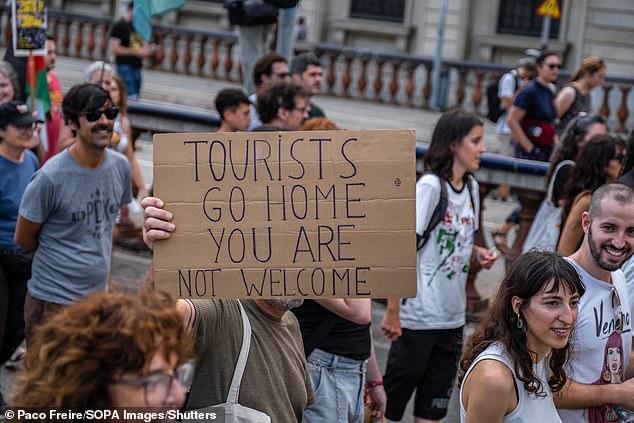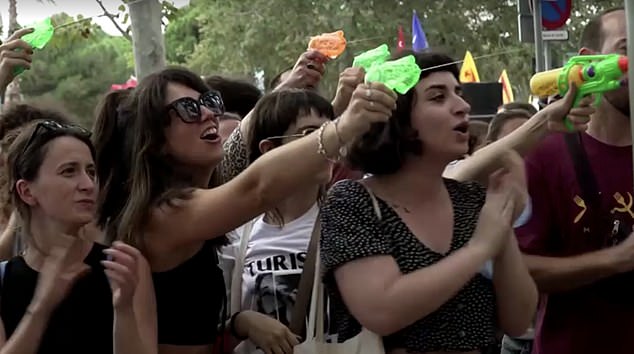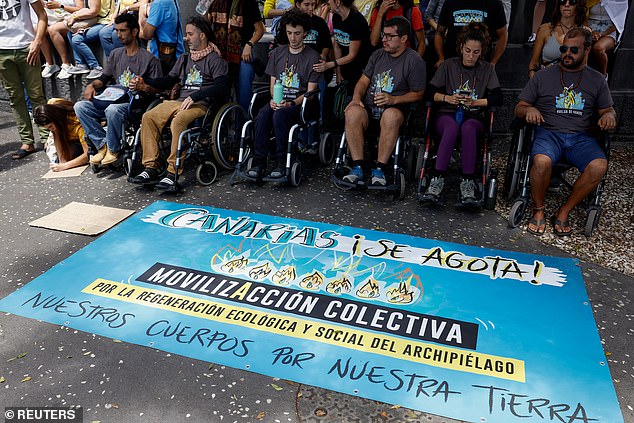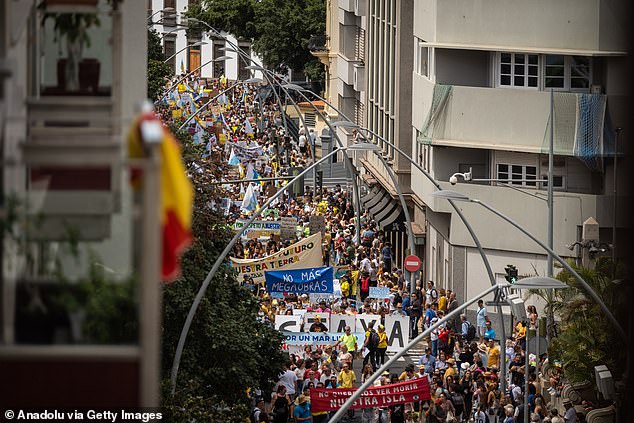Mallorca officials plead with protesters to leave Britons alone after they were sprayed with water pistols in Barcelona, as the island prepares for a major anti-tourism demonstration on Sunday
Majorcan officials have pleaded with anti-mass tourism protesters set to take over Palma next Sunday to leave British holidaymakers alone.
Regional government officials have made it clear that there must be no repeat of what happened in Barcelona earlier this month, when tourists were sprayed with water pistols by protesters.
Foreign tourists were booed and jeered by some locals as they ate dinner on terraces in Palma’s Weyler Square during the latest protest in the Majorcan capital on May 25.
Ultimately, the organizers publicly apologized for the insults they experienced.
Balearic politicians fear that Sunday’s new demonstration will be marked by expressions of tourism anxiety, and have called on locals to show “respect” to tourists.
People hold a banner reading ‘Mallorca is not for sale’ as they take part in a protest against mass tourism and gentrification on the island ahead of the summer season in Palma de Mallorca in May

An anti-tourism placard is seen during an anti-tourism demonstration in Barcelona earlier this month. More than 3,000 people demonstrated against the overcrowding of tourists in the city of Barcelona and for policies to reduce tourism.

Protesters fired water pistols at tourists eating at popular spots in the city
Antoni Costa, a spokesman for the regional government, said last night that authorities were concerned, despite his bizarre public insistence that this was not the case. He said: ‘There is no fear because it has never happened here and people have always been respectful.’
‘But we saw a certain kind of behaviour in Barcelona that, as you can imagine, we didn’t like.
“We ask for the utmost respect for those who have decided not to demonstrate and urge those who do protest to do so in a peaceful manner and not to disturb other citizens and visitors.”
Spain’s tourism minister condemned protesters who doused tourists with water pistols during a July 6 protest in central Barcelona.
Jordi Hereu, a former mayor of Barcelona, described their actions as reprehensible.
He went on to say that they did not represent the country’s hospitality culture, stressing: “I want to reaffirm the values of hospitality and Spain’s Spanish tourism model and one of its hallmarks, which is safety.”

People on hunger strike sit in wheelchairs during a protest for a change in the tourism model in the Canary Islands, in Santa Cruz de Tenerife, Spain, in April

In April, protesters flood the streets of Tenerife, calling on local authorities to temporarily limit the number of visitors to relieve pressure on the islands’ environment, infrastructure and housing stock, and to impose restrictions on property purchases by foreigners.
Hoteliers in Spain have admitted that the anti-mass tourism protests that have taken place in many parts of Spain since April, with thousands of people taking to the streets in the Canary Islands, have left some holidaymakers feeling unwelcome.
Gabriel Escarrer, president of the non-profit organization Exceltur, which is made up of the presidents of the 30 largest Spanish tourist organizations, said recently: “This is the worst thing that can happen.”
The organizers of next Sunday’s protest in Palma are already predicting that it will be “historic.”
Originally, people on all four Balearic Islands, including Ibiza and Menorca, were to take to the streets of their capitals on the same day. However, these plans were dropped in favour of separate but coordinated actions over the summer.
Yesterday, the unions UGT, CCOO and STEI, which had urged the public to join Sunday’s demonstrations, called for an economic model that “does not create job insecurity”.
During a joint press conference, CCOO Secretary General José García, UGT Baleares spokesperson Xisca Garí and STEI Secretary General Miquel Gelabert said that tourist overcrowding is “unsustainable” as it increases the workload for locals without improving their quality of life.
In recent months, protests against tourism have taken place in Spain, with locals demanding stricter controls on holidaymakers.
Earlier this month, under the slogan “Enough! Let’s put limits on tourism,” some 2,800 people marched through a waterfront neighborhood in Barcelona to demand a new economic model that would reduce the millions of tourists who visit each year, according to police.
Protesters carried signs reading “Barcelona is not for sale” and “Tourists, go home”, before some used water pistols on tourists eating outside restaurants in popular tourist hotspots. Shouts of “Tourists out of our neighbourhood” were heard as some stopped outside hotel entrances.
Barcelona’s soaring house prices, which have increased by 68 percent in the past decade, are one of the main issues facing the movement, along with the impact of tourism on local commerce and working conditions in the city of 1.6 million.
Meanwhile, tourist saturation has become the biggest topic in Mallorca in recent months. The Balearic Islands received almost 18 million tourists last year and this year bookings for the summer have increased by 15%, the president confirmed.
In the Canary Islands, 50,000 people took to the streets of Tenerife in April to protest against tourism on the island.
Protesters held banners reading “You enjoy, we suffer,” claiming that the huge influx of tourists to the island is causing environmental damage, driving down wages and forcing locals out of cheap housing, forcing dozens of people to live in tents and cars.
